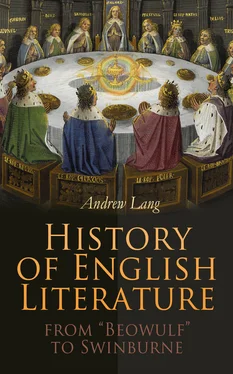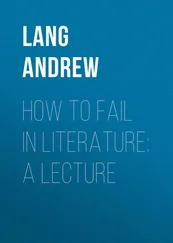"Horn" is a fair example, happily short, of the novels of the period, which, in essence, are like all good novels that end well. Assonance (rhyme of vowels but not of consonants) occurs in the verse:—
He lokede on his rynge,
And thogte on Rymenhilde.
It is not necessary to analyze the plots of all the romances: two or three enable us to estimate the kind of fiction that was popular with ladies in bower.
"Sir Beues of Hamtoun" is another English romance, concerning the son of the Earl of Southampton and his wife, a princess of Scotland. The Earl is old, and his bride proposes to the Kaiser to kill the Earl and wed herself. The Emperor promptly invades England and cuts off the head of the good Earl. The Scottish traitress orders the murder of her son, Beues, but is deceived by her agent, and Beues knocks down the Kaiser.
The boy is sold and sent to Armenia, where he refuses to worship Apolyn (Apollo). The pagan king has a fair daughter, Josian, who becomes the mistress of Beues, while he has a conquered giant, Ascopart, for page. After a thousand adventures, Beues and Josian, being true lovers, make a good end, and die together. The English writer, prolix as he is, has shortened his French original, in places, made additions in others, and generally writes with freedom.
The same happy end, simultaneous death, rewards the hero and heroine of "Guy of Warwick". The hero's unexplained forgetfulness of his lady, Felice, is borrowed from the ancient popular tale in Scots, "The Black Bull of Noroway," where the forgetfulness is explained. Many stock incidents of the romances come from popular tales ("Märchen") of unknown antiquity. Felice is a very learned and rather hard-hearted maiden, and Guy, when in love, faints frequently. The romance contains every kind of adventure with dragons, lions, and human foes, and as much religion as devout damsels could desire, or even more, for Guy, in a devout mood, deserts the learned Felice for a life of chastity and military adventure. As usual he returns in the guise of a palmer.
The "Arthour and Merlin," a rhymed romance of the old story, from the Auchinleck manuscript, about 1320, has not the gleams of true poetry that shine in Layamon's "Brut," and is verbose and incomplete—the tragedy of Arthur is absent. We find, however, the story of how Arthur won the sword Excalibur, thereby proving himself a true prince, for no other man could pluck it from the stone into which it was driven. King Lot (Llew, a historical personage apparently), could not draw forth Excalibur. Sir Kay, one of Arthur's companions in the oldest Welsh tales, appears, with Sir Gawain, whose character, as in the Welsh romances, is far above that which he displays in the "Idylls of the King"; Merlin continually exercises the art of glamour, appearing in various forms, and Arthur loves Guinevere, but the poet wearied of his toil long before the last battle in the west.
He professes that, as many gentlemen know not French, and as
Right is that Inglische understand
That was born in Inglond.
he sings in English of the glory of England, Arthur. The final English-form of the great Arthurian tale may best be considered when we arrive at the date of Sir Thomas Malory and Caxton. In Malory's "Morte Arthur" the long dull wars of the king against the Anglo-Saxon invaders are much compressed, while the epic, tragic, and mystic elements, the great character of Lancelot, the mournful victory of the winning of the Grail, and the end of all, are handled with genius.
The story of Troy had a hold on the mediaeval mind only less strong than the story of Arthur. In early English, at the end of the fourteenth century, we find the romance in the revived Anglo-Saxon alliterative form ; it is the "Geste Hystoriale" concerning the Destruction of Troy, and the story is told once more in the rhyming couplets of the "Troy Book". The manuscript of the "Troy Book" is marked "Liber Guilielmi Laud, Archiepiscopi Cantuar et Cancellarii Universitatis Oxon 1633". (The book of William Laud, Archbishop of Canterbury and Chancellor of the University of Oxford.)
The author of the alliterative romance begins by saying that learned men wrote the history in Latin, but that poets have corrupted it by fables and partisanship. Homer, he says, was notoriously partial to the Greeks; moreover, he introduced incredible gods fighting like men. Ovid, on the other hand, was "honest"; Virgil was true to the rightful cause, that of Troy; but the best authority is Gydo (Guido de Colonna).
Such was the nature of historical criticism as understood by the mediaeval romancer. For love of lost causes, and, as descendants of the Trojans through the Brut of mediaeval myth, the romancers detested the Achæans, the conquering Greeks.
The Story of Troy from Homer to Shakespeare.
The history of the development of the "Tale of Troy," as Chaucer and even as Shakespeare knew it, is very curious. Homer himself, perhaps living about 1100-1000 b.c., tells, in the Iliad and Odyssey, parts of the "Tale" as it was known to his own people, the conquering Achæans, who were to the older dwellers in Greece what the Normans were to the English. They finally melted into the older population, who, about 800-700 b.c., wrote poems of their own about the "Tale of Troy," altered the facts, and blackened the characters of Homer's greatest heroes. Later, again, the great Athenian tragedians, of the fifth century b.c., wrote dramas more on the lines of the conquered population of Greece than on those of Homer, and they still more deeply degraded some of the heroes of Homer. The Romans, looking on themselves as descended from the Trojans, persevered in the same course, and a Greek, after the Christian era, wrote a prose version of the "Tale of Troy," pretending that it was a manuscript by Dictys of Crete, who was a spectator of the Trojan war. A similar prose book was attributed—to another spectator, Dares of Phrygia. These books tell the story of Troilus and Cressida, of Palamedes, and many other tales unknown to Homer. But, in Western Europe, Homer was unread, and unknown in England till Chapman translated him: and all the romancers about Troy—Lydgate, Chaucer, Caxton, and the rest, down to Shakespeare,—depend on the false tales whose growth we have described.
Probably the first romancer who expanded the bald prose narratives of Dares and Dictys, was Benoît de Sainte-Maure (1160) in a long French rhyming poem. He unites the fates of Briseida (Briseis, daughter of Calchas, the Greek priest who is made a Trojan), and Troilus, son of King Priam. Briseida, through a confusion with Homer's "Chryseis," daughter of Chryses, the Phrygian priest of Apollo, later becomes the "Cressid" of Chaucer and Shakespeare. Meanwhile "Gydo" or Guido de Colonna, did the French of Benoît into Latin prose (1287) and Guido is the source of the English authors of the alliterative and the rhyming romances of Troy. The pedigree of the story is
Pseudo-Dares—Pseudo-Dictys
|
Benoît de Sainte-Maure
|
Guido de Colonna
|
The English Romances.
Through Caxton's printed "Book of Troy," the story continued popular, a cheap edition appeared in the eighteenth century.
Each of Homer's poems, the Iliad and the Odyssey, deals but with the adventures of a fortnight, or six weeks, but the mediaeval readers wanted, and from the romancers received, the whole history of the ten years' siege, and more, with Christian legends thrown in, with minute descriptions of all the characters—Cassandra "gleyit a little," had a slight cast of the eye like Mary Stuart. The heroes fight as mounted knights, not in chariots; they use cross-bows as well as long-bows; and Hector kills men by the thousand, with more than Irish exaggeration. As Hector must be killed, Achilles suddenly charges him in front, while his shield is slung behind. Had a Trojan poet left an epic on the war he would not have told the story otherwise. The poet of the Laud "Troy Book" bids God curse Æneas as a traitor, forgetting, apparently, that the British are descendants of Æneas.
Читать дальше












